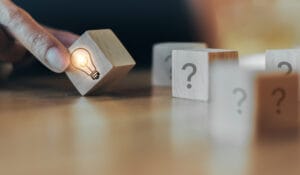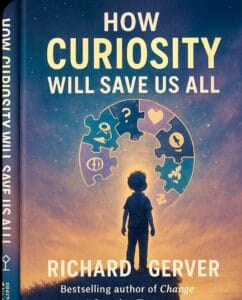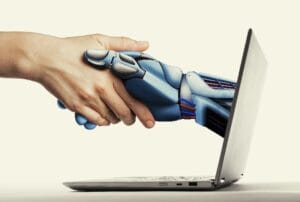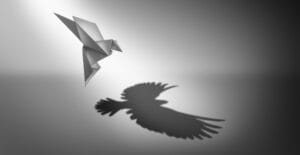
Over the last couple of decades, especially since the global financial crisis we and our organisations have been operating increasingly on the back foot, levels of stress and adverse mental health conditions are rising dramatically, there is real evidence of high levels of anger and polarisation and a general feeling that we can’t deal with the rate of change and uncertainty in our lives.
It leads me to ask, why?
The answer lies partly in the way we are raised and educated. Our culture is predicated on certainties. From an early age we are taught to get stuff right. We are told that if we get our heads down and do what we are asked and told, our reward will be a degree of certainty. It won’t always be glamourous, but it constitutes a job, potentially a career, which leads to a salary, which means, in turn, that we can have a home of our own, food on the table and a few luxuries like a holiday for example. For most of us, for most of the time, this has rung true for the best part of the last 50 or 60 years.
We went to school; we learnt to read and write, and we discovered some important stuff about our world and our place in it.
Some of us went on in our educational journey, to university or college, some on to apprenticeships and some straight out to work.
Then it was about finding security and building a life before we focused on a pension and hopefully a secure retirement.
For generations, we saw trades passed down, often dependent on geography. It wasn’t very exciting for many, but it was predictable and safe. It was a way of life.
Whatever the career and pretty much wherever we were in the developed world, it was about us and our ability to accumulate certainty.
We knew what levers to pull and what rails to hold on to and once we had found our ‘level’, we would be ok.
Only increasingly, we weren’t.
Society has for generations, seen learning as finite, as a means to an end. The end being that career.
Education was simply part of the journey, of the process, of the assent to adulthood and a livelihood.
Yes, things in the world evolved, but they did so at a pace we could, on the whole, cope with. As long as we kept our heads down, and kept up our levels of productivity and efficiency, things would be fine.
Then, like an horrific wake up call, along came COVID-19, and amplified and accelerated everything.
Why did we hoard toilet paper? Because we were desperate to find a semblance of control, of stability. Our world was being rocked in a way most of us had never imagined, let along experienced. We were scrambling around for something, anything, an anchor, the type we had been taught and raised to seek out from childhood.
As we head towards the 22nd Century, we are, to an extent, in a constant state of panic. The predictability of the world as it was, is diluting at a dramatic rate, whether it’s the rapid development in digital technology, the change in geo economic and political orders, or the environmental challenges we face, and/or a mix of all three, our future depends on our ability to think differently, to thrive in times of accelerating transformation and to learn constantly, without fear. At the heart of that transformation is something we are all born with, that allows us to go from being pretty helpless newborns to becoming the most intelligent of species, it is something that I had the great privilege of seeing up close and personal every day, in my first career, as a teacher. Young children are amazing learning machines, their accelerated development and adaptability amazes me to this day, and what lies at the heart of it?
Curiosity.
As fully formed human beings, when we encounter a challenge, something unpredictable; a problem we didn’t anticipate, or a situation beyond our perceived control, most of us experience at least one form of anxiety.
Mental Paralysis
For me, the first thing that goes, is my ability to concentrate and to think clearly. I often experience a kind of mental paralysis. You know those moments when you are reading something, for work or for pleasure, and whilst you know you are reading the words and sentences, you look up and realise that you haven’t processed any of it. It’s like that. Nothing seems to be going in.
Denial
Occasionally, and we saw this a great deal during the pandemic, people try to rationalise through denial. How often do you hear people try to persuade themselves as much as you, that it won’t be that bad, it will never happen, it’s simply not true. Denial or false realities is something we are seeing more and more, especially with the help of digital technologies and social media. People are vulnerable to it, and the more they feel a lack of control, the further down the rabbit hole they scramble.
Anger
Over the last couple of decades, we have all seen a dramatic amplification of anger which in so many cases can be traced back to a sense of disenfranchisement. Increasing numbers of people feel that they are now clinging on to a world that is spinning too fast for them to control, our energy is being burnt through and no matter how fast we run, the target seems further and further away, or the rules of the game suddenly change. We are left angry; we feel we have been lied to, deliberately forgotten or thrown under the bus.
Despair
The World Health Organisation’s data suggests that somewhere in the world, every 40 seconds, someone takes their own life. It is estimated about 10% of the globe’s population has a diagnosed mental health disorder, in the United States that figure is about 25%.
In her 2021 bestseller Dopamine Nation, Stanford’s director of addiction medicine Anna Lembke wrote:
“We’re living in a time of unprecedented access to high-reward, high-dopamine stimuli: drugs, food, news, gambling, shopping, gaming, texting, sexting, Facebooking, Instagramming, YouTubing, tweeting – the increased numbers, variety and potency are staggering. The smartphone is the modern-day hypodermic needle, delivering digital dopamin 24/7 for a wired generation. As such, we’ve all become vulnerable to compulsive overconsumption.”
We are living in increasingly dangerous times, where despair is acute and the ‘drugs’ we are using to mask it are amplifying our sense of dependency on others.
When we feel vulnerable and victims of uncertainty and circumstance, we look to something or someone to help us, we retreat to the dependency culture we were raised and educated to rely on. But young children haven’t been taught that yet, so they resort to curiosity, which in turn leads to learning; self-directed, rewarding and empowering. That is why, learning must be at the heart of our culture moving forward, not defined by our age, or finite at the point we leave formal education, but embedded and lifelong.
Imagine the human potential we could tap into, if we kept curiosity burning bright, we encouraged questioning, challenge and development through life, personally and professionally.
In 2019, I had the opportunity to interview Barry Barish, the 2017 Nobel Prize winning physicist. I asked him how he had gone about recruiting the team, that worked with him on his award-winning exploration into gravitational waves. He said two things that struck me, both connected and deeply provocative. He said that when he was recruiting, he was looking for people who had,
“The ability to challenge the beauty of the proof.” And the
“Courage to ask stupid questions.”
If we are to avoid the panic that comes from being so relentlessly reactive, that results in quick decisions, often reflexive and short term, that can be strategically flawed, we need to develop greater conditions for curiosity and therefore learning to flourish, not as a result of events but to pre-empt them.
Through my speeches, workshops and writing, I explore how we develop, value and embed a real learning culture that will explain, amongst other things how to;
Create an environment that invites inquiry by guiding people in asking questions about their own work, the company, and its processes, systems and structures.
Create challenging learning-based goals that encourage curiosity.
How by modelling mindful questioning, leaders can transform conversations and culture.
So, whatever you do. Don’t panic, let’s start working together.



